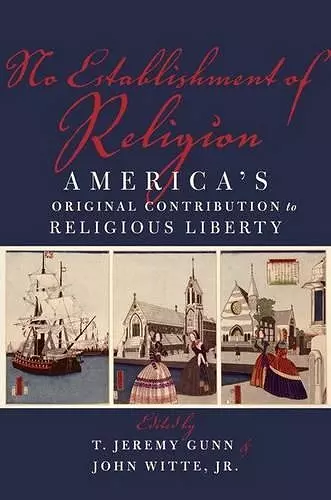No Establishment of Religion
America's Original Contribution to Religious Liberty
T Jeremy Gunn editor John Witte editor
Format:Paperback
Publisher:Oxford University Press Inc
Published:29th Nov '12
Currently unavailable, and unfortunately no date known when it will be back
This paperback is available in another edition too:
- Hardback£112.50(9780199860371)

America's most original legal invention may be the First Amendment guarantee that ''Congress shall make no law respecting an establishment of religion.'' This constitutional provision rejected the millennium-old Western policy of supporting one form of Christianity in each nation and subjugating all other faiths. It was both original and deeply challenging. The new nation encountered difficulty removing the traditional laws that controlled religious doctrine, liturgy, and church life and that discriminated against unpopular religions, and found it even harder to decide more subtle legal questions that continue to divide Americans today: Did the constitutional prohibition on establishment of religion prohibit governmental support for religion altogether, or did it just bar preferential support for some religions over others? Did it require that government remove Sabbath day, blasphemy, oath-swearing and other laws historically rooted in religion, or could those laws now be justified on grounds of tradition, morality, or utility? Did it mean the removal of all religious texts, symbols, and ceremonies from public documents and government lands, or could a democratic government represent these in ever more inclusive ways? Did the First Amendment Establishment Clause bind only "Congress " or were state and local governments bound, too? This twelve essays of this volume examine the diverse and shifting answers to these questions from the founding era until modern times. They show how the eighteenth-century founders took the first decisive steps toward disestablishment of religion, but with diverse political, theological, and philosophical goals in mind. No Establishment of Religion also shows how America's ongoing battles over religion and education, immigration, polygamy, religious funding, religious exemptions, and more have made the original and evolving understanding of disestablishment of religion a source of perennial cultural and constitutional controversy. The authors of the essays stake out strong and sometimes competing positions on what ''no establishment of religion'' meant to the American founders and what it can and should mean for America today. They represent a wide array of perspectives on the genesis and genius of America's original contribution to religious liberty, exposing the fallacies of viewing America as either a Christian nation bent on perpetuating biblical ideals or a secular nation built with a high and impregnable wall of separation between church and state.
An excellent guide for anyone interested in exploring the constitutional aspects of American church history. * Church History *
Readers of the Gunn and Witte collection will get superb, vigorous essays outlining two and a half centuries of interactions between American governments and denominations, religious movements, and individual believers . The essays are so wide-ranging and generally well done that the collection reflects the best scholarship on a subject still roiling modern American life and politics. * Journal of Religion *
The editors of this sterling collection recruited an all-star lineup of contributors... Historians, legal scholars, political scientists, jurists, legislators, and an interested general public should all benefit from this book... superb. * Renewing Minds *
As the outstanding and wide-ranging essays in this volume illustrate, Americans have often disagreed about the meaning and application of the Establishment Clause of the Constitution, and have sometimes confused it with an anti-religious or secularizing policy of marginalizing or privatizing religion. The project of securing the human right to religious liberty by disentangling political and religious authority is ongoing and-as national and world events remind us every day-pressing. This book offers both a helpful introduction to and an insightful debate about the history and future of this project. * Richard W. Garnett, Professor of Law and Associate Dean, Notre Dame Law School *
ISBN: 9780199860395
Dimensions: 155mm x 234mm x 31mm
Weight: 567g
432 pages